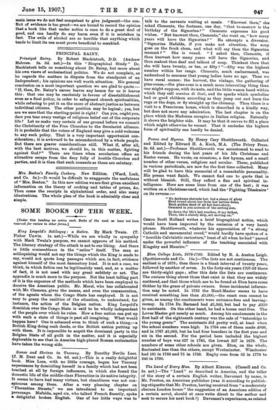Scenes and Shrines in Tuscany. By Dorothy Nevile Lees. (I.
M. Dent and Co. Is. 85. net.)—This is a really delightful book. Miss Lees, with no little courage, began her Tuscany experiences by domiciling herself in a family which had not been touched at all by foreign influences, in which she found the domestic life of the middle-class Florentine in its native integrity. It seems to have had many virtues, but cleanliness was not con- .spicuous among them. After a very pleasing chapter on "Florentine Streets," we are introduced to an important personage. Mafalda, aged six, who talked French fluently, spoke & delightful broken English. One of her little ways was to
talk to the servants waiting at meals. "Knowest thou," she asked Clemente, the footman, one day, "that to-morrow is the birthday of the Signorina ?" Clemente expresses his good wishes. "But knowest thou, Clemente," she went on," how many years will have the Signorina ?" He attempts a diversion. "Signorina Mafalda, if you make not attention, the soup goes on the frock clean, and what will say then the Signorina mammk ? " She is vexed. "I asked thee, Clemente, if thou Imewest how many years will have the Signorina, and thou makest thee deaf and talkest of soup. Thinkest thou that she will have twenty, or ten, or fifty ? "—fifty was the highest number within her range. Clemente, much embarrassed, was understood to murmur that young ladies have no age. Then we have rural scenes the harvest, the vintage, the gathering of pine-cones,—the pine-cone is a much more interesting thing than one might suppose, with its nuts, and the little waxen hand within which they call ntanina di Gestt, and its sparks which symbolise bad or good children according as they jump out and burn the rugs or the dogs, or fly straight up the chimney. Then there is a visit to a Franciscan house, which is described in a kindly way, but does not move any admiration. The last chapter is on the place which the Madonna occupies in Italian religion. Naturally it shows the brighter side. It may be that it serves to fill a place which might otherwise be vacant. That it excludes the highest form of spirituality can hardly be denied.






































 Previous page
Previous page